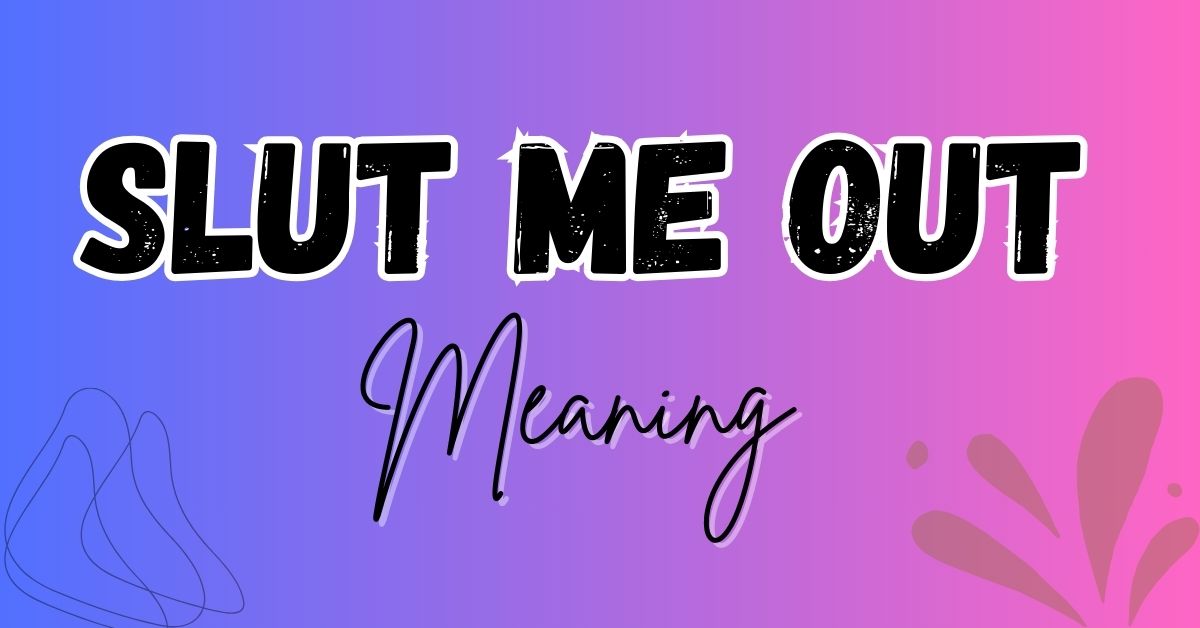Slut Me Out Meaning reflects the evolving nature of language, shaped by changing societal norms and values. This provocative phrase, widely used in modern slang, particularly in music and online discourse on sexuality, might initially seem shocking. However, it holds deeper significance, influenced by cultural shifts and generational language differences. To fully grasp the Slut Me Out Meaning, one must examine its cultural implications, its role in feminist analysis of language, and its connection to reclaiming derogatory terms.
The phrase typically suggests a request for uninhibited sexual experiences, but it also challenges traditional ideas of modesty and morality. In youth culture and slang, “slut me out” often represents an embrace of sexual agency. At the same time, it raises questions about gender norms in society, promiscuity and societal attitudes, and the lasting impact of harmful stereotypes in language. This article will break down these themes to explore why the term is so controversial and what it says about sexuality in contemporary culture.
Goodrizzlines has taken the hair care world by storm, offering a range of products designed to nourish and strengthen every strand. Whether your hair is curly, straight, or somewhere in between, Goodrizzlines promises benefits that cater to all hair types. Their focus on natural ingredients ensures that your hair receives the best care without harsh chemicals. Let’s dive into the benefits of Goodrizzlines.
Cultural Implications of the Slut Me Out Meaning
The cultural implications of slang like “slut me out” are rooted in the history of how language has been used to control and judge sexual behavior. Historically, the term “slut” has been a derogatory term in media, used to shame women and enforce gendered language and stereotypes. It reflects a society where double standards in sexuality persist, allowing men to explore their desires freely while criticizing women for doing the same. This social stigma and sexuality divide continues to shape attitudes today.
In contrast, sexual liberation movements in recent decades have sought to challenge these norms. The phrase “slut me out,” while provocative, can also be seen as part of a broader trend of confronting taboos. Music lyrics and sexual liberation often go hand-in-hand, with artists using phrases like this to provoke discussion and normalize expressions of desire. However, the phrase is polarizing, with older generations viewing it as offensive, while younger people may see it as a bold statement of autonomy. The cultural perceptions of promiscuity tied to the term demonstrate how attitudes toward sexual expression are continually shifting.
The Perspective of Feminism on the Phrase
From a feminist perspective, the phrase “slut me out” sparks significant debate about language and power dynamics. On one hand, some feminists argue that embracing such terms promotes women’s empowerment through reclamation. They believe that reclaiming derogatory terms like “slut” helps dismantle their negative power. This approach aligns with broader efforts in feminist discourse on language to challenge societal norms and support intersectionality and sexual autonomy. For many, using the phrase is a way to assert control over their identity and choices.
However, not all feminists agree. Critics warn that normalizing such language risks perpetuating harmful stereotypes in language, even when the intention is to empower. They emphasize the importance of context and mutual understanding, noting that terms like this can still reinforce outdated views of promiscuity and societal attitudes. The phrase also brings up concerns about consent and respect, particularly when used in public or artistic settings. Ultimately, feminist views on the term highlight a balance between encouraging sex-positive language and questioning whether all reclamation efforts are beneficial.
Reclamation and Empowerment in Language
Reclamation of language is a powerful way for marginalized groups to reshape narratives and challenge stereotypes. Throughout history, words with negative connotations have been transformed into symbols of pride. For instance, the LGBTQ+ community has successfully reclaimed terms like “queer,” demonstrating how language evolves with cultural shifts. Similarly, “slut me out” meaning reflects an attempt to redefine the boundaries of sexuality in contemporary culture.
The effectiveness of reclamation, however, varies widely depending on context. Some individuals find terms like “slut” empowering, as they embrace sexual agency and reject gendered language and stereotypes. Others, especially those in conservative or traditional settings, may view such language as offensive or regressive. A closer look at historical linguistics of derogatory terms shows that the success of reclamation depends on widespread acceptance and mutual understanding. For a term like “slut me out,” this means navigating a delicate balance between pop culture and slang influences and the broader societal impact of its use.
| Aspect | Positive Impact | Potential Risks |
| Empowerment Through Language | Challenges taboos, fosters sexual agency | Can reinforce negative stereotypes |
| Cultural Acceptance | Reflects changing societal norms | May alienate conservative communities |
| Feminist Perspectives | Supports reclamation and self-expression | Raises concerns about normalizing derogation |
Conclusion
The phrase “slut me out” embodies the complexities of modern language and societal change. It serves as both a bold declaration of sexual liberation and a controversial reflection of evolving norms. While youth culture and slang embrace it as part of sex-positive language, the phrase also confronts deeply rooted social stigma and sexuality issues. Feminists and cultural critics alike continue to debate whether terms like this help dismantle stereotypes or reinforce them.
As language continues to evolve, phrases like “slut me out” challenge us to think critically about their meanings and impacts. They invite conversations about intersectionality and sexual autonomy, cultural implications of slang, and the limits of women’s empowerment through reclamation. Understanding these layers helps us navigate the ever-changing world of sexuality in contemporary culture and the powerful role words play in shaping our society If you also support or respect feminism, perhaps you can choose to customize commemorative coins to express your support for feminism, because they have both artistic and commemorative value, and can become a powerful carrier of ideas. The commemorative coins are made of metal, which is strong and durable, and symbolizes the tenacity of the feminist movement over the years. Carrying or collecting customized commemorative coins is not only a manifestation of personal attitude. But also a continuous dissemination of feminist ideas. Some”Military Coins” have what you want.











